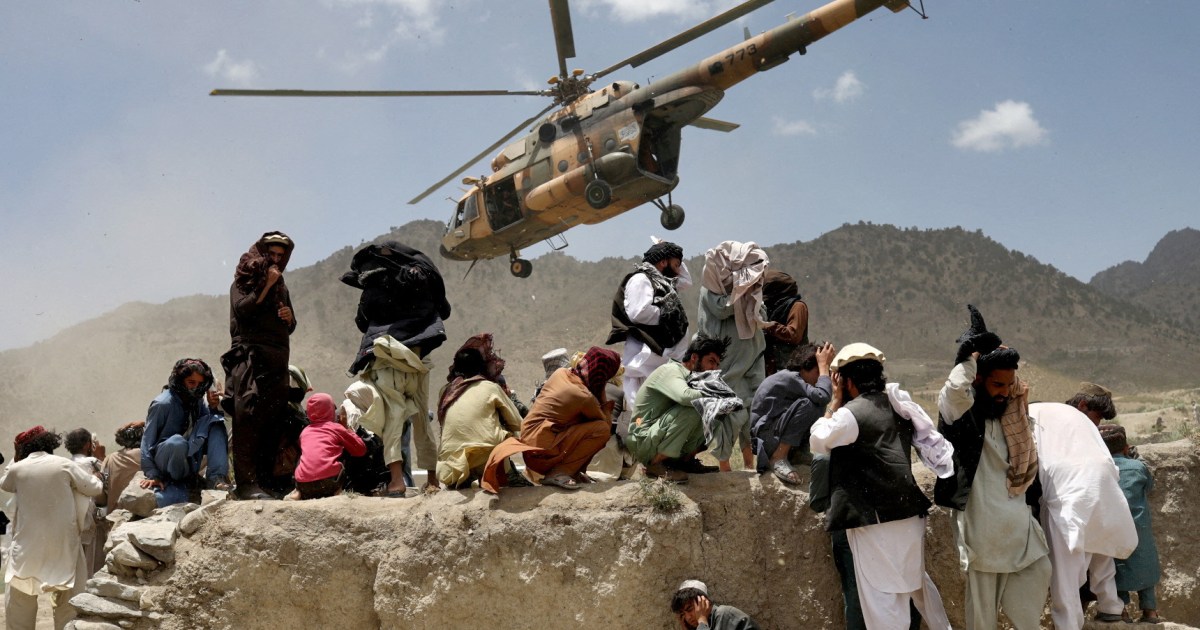Taliban call for unfreezing of bank funds after deadly earthquake
Aid groups said that, in the past, Taliban authorities tried to divert aid to areas and people that supported their views.
Afghanistan’s Taliban administration has called on international governments to roll back sanctions and lift a freeze on the country’s central bank assets as the country deals with the aftermath of an earthquake that killed more than 1,000 people and has left thousands homeless this week.
While humanitarian aid has continued to flow to Afghanistan, funds needed for the country’s longer-term development were halted when the Taliban seized control of the country last August.
Since then, billions of dollars in Afghan central bank reserves remain frozen overseas amid international sanctions on the Taliban government that has hampered the domestic banking sector and left the country’s new rulers with few reserves.
“The Islamic Emirate is asking the world to give the Afghans their most basic right, which is their right to life and that is through lifting the sanctions and unfreezing our assets and also giving assistance,” Abdul Qahar Balkhi, foreign affairs ministry spokesman, told Reuters in an interview.
Balkhi said Afghans’ right to life-saving funds should be the priority.
The earthquake that struck the east of the country early on Wednesday damaged or destroyed 10,000 homes and also injured about 2,000 people, straining the country’s fragile health system and posing a major test for the Taliban government.
Taliban pledge no interference with aid
Aid organisations have complained that, in the past, Taliban authorities had tried to divert aid to areas and people that supported their views – or even seized goods to distribute themselves and claim the credit.
Khan Mohammad Ahmad, a senior Taliban official in hard-hit Paktika province, said international organisations helping relief efforts would not be interfered with.
“Whether it is WFP, UNICEF or any other organisation … the international community or the United Nations … they will do the distribution by themselves,” Khan said.
“The responsible people from the Islamic Emirate are here … our members will be always with them [to help],” he added, referring to the Taliban’s new name for Afghanistan.
![Afghan men examine the damage to their houses after a recent earthquake in Gayan, Afghanistan, June 23, 2022 [Reuters]](https://www.aljazeera.com/wp-content/uploads/2022/06/2022-06-24T133232Z_1255929733_RC2MXU90Z46T_RTRMADP_3_AFGHANISTAN-QUAKE.jpg?w=770&resize=770%2C513)
Emergency response teams stretched
Afghanistan is frequently hit by earthquakes, especially in the Hindu Kush mountain range, near the junction of the Eurasian and Indian tectonic plates.
Delivering aid has been made more difficult because the quake struck areas already suffering the effects of heavy rain, causing rockfalls and mudslides that wiped out hamlets perched precariously on mountain slopes.
Communications have also been hit with mobile phone towers and power lines toppled.
Officials say nearly 10,000 houses were destroyed, an alarming number in an area where the average household size is more than 20 people.
Even before the Taliban takeover, Afghanistan’s emergency response teams were stretched to deal with the natural disasters that frequently strike the country.
But with only a handful of airworthy planes and helicopters left since they returned to power, the Taliban’s response to the latest catastrophe is further limited.




